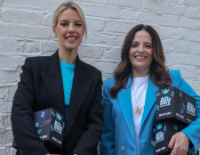NB: Firstly can you give our readers an idea of your backgrounds and what motivated you to start Ruly?
Sophie: We met working at a beauty brand that was part of Unilever Ventures. I was Managing Director, and Lydia was the Finance Director. I also have a passion for food and drink, and back in 2007 I opened a multi-award winning restaurant called East Beach Cafe in Littlehampton, West Sussex. While working alongside Lydia, we like everyone else in the office ate birthday cake or drunk lots of coffee throughout the day to power through - especially during the 3pm slump. None of that made us feel good! We don't like energy drinks so that wasn't an option. As we both worked in consumer goods, we wondered if there was an alternative. We love talking about brands and products so just discussed for many hours what it could be. And the idea for Ruly was born - an energy boost that feels like a delicious treat, without the crash. Rather than you having one gummy or having to gulp down a whole can of drink to give you energy, you can ‘microboost' and so control how much you need at that moment.
Lydia: I have similarly worked on consumer brands, heading up finance teams, mostly, but soaking up and getting involved in all aspects of the business. It was always a dream of mine to run my own business. Meeting Sophie kickstarted things. We both love food and drink brands - we are those people that think going to the supermarket on holiday is massively fun just to see unknown brands and what sells well in other countries.
NB:The energy nutrition markets are quite crowded, did you have a clear strategy to create a new energy based genre from the start?
Lydia: We saw a real gap in the market within the energy sector - you've got drinks, powders, shots - but delicious candy is a totally new format for energy. We used the relationship between energy drinks and soft drinks and then applied this to energy sweets versus sweets. We believe that energy candy could be worth up to £640 million in the UK. In 2023, the Sports and Energy Drinks market was worth £3.1bn. The carbonated soft drinks market was worth £9.2bn in 2023. This shows a 34% market size for Energy Drinks versus carbonated soft drinks. If we apply the same 34% market size to sugar confectionery - worth £1.9bn in 2023 versus energy candy, we're looking at a market size of potentially £640m. We're aiming high - Red Bull's market share currently sits at 19%, we're potentially looking at retail sales of £120m in the UK alone. If sales are not progressing with certain energy brands at the moment, it's indicative that the market is ripe for innovation. That's where Ruly steps in.
Sophie: The energy market is crowded, and that's because it's a really exciting place to be. The consumer need is really clear and growing fast, people want energy and they need more of it. Where you have clear consumer need there is always room for innovation to serve consumers better.
NB:How long did it take before you had a marketable product?
Sophie: It took around 12 months to create a product that was marketable. We spent a long time finding the right manufacturer, creating the right texture for the candy and an intensely fruity flavour as well as the best caffeine concentration. When you start your own business, every hour counts. How you decide to use your time that day, impacts how the business will go pretty much immediately. Your daily, weekly, and monthly focus shapes the direction that the business will take, and the tone that you set sets the tone for the whole business.
Lydia: The best moment so far has been seeing the consumer response to the product - we did testing on the street. We decided initially to go with two flavours that we know the UK loves - red berries, and tropical. We're trialling our first two SKUs with some independent stores, forecourts, and cycling shops in London. The response has been fantastic. We've found those that are used to caffeine gels are trying us and loving the results.
NB: Given you are breaking new ground with your innovative energy candy, has finance been a problem at any stage?
Lydia: We've had early investment - a £500k raise was successful.
We're also lucky to have a great network: we speak regularly to current and exited consumer entrepreneurs from a wealth of different sectors: no alcohol beers, kids snacks, personal care, beauty retail, functional snacking, gourmet sweets. Everyone has had such a different experience, and all of it very valuable to hear about.
NB: Here we are half way through 2025, is Ruly where you planned to be at this stage?
Sophie: When you are an entrepreneur, you are extremely impatient by nature and you want everything to happen today or this week. But of course that's not how businesses are built, they take time. As long as you keep your eyes open and move as fast as you can, everything ends up in the right place at the right time.
NB What's on the to do list for the next few years, more flavours, expanded markets, or maybe world domination?
Lydia: 96% of 18-34 year olds in the UK eat sweets, so there is a lot to go after here in the UK. Building strong and mutually beneficial relationships with retailers is a central part of our plan. After that there are some really interesting international markets, the most attractive of which is the US where we have already established interest in the product.
Sophie: We're definitely planning more flavours and textures, especially sours. We want to be the most delicious, most useful confectionery business in the world. Let's say we want to ‘rule'
the candy market!
For more information visit Ruly






